Movie-wise 1998 will go down in memory as a year of misunderstood classics. That’s a good thing for the purposes of this listing, which is devoted to thirty obscure and/or underappreciated films from the year 1998.
One thing that stands out about ‘98 is the overpowering bleakness and pessimism of its movie releases, a fact I’m certain is not unrelated to the ire so many of those films inspired. I distinctly recall a number of outraged editorials bemoaning Hollywood’s apparent obsession with “evil” subject matter.
Had the authors of those editorials taken a good look around they might not have been so shocked. 1998, remember, was the year of the impeachment of President Bill Clinton, a time when disillusionment in politics, and virtually everything else, was rampant. The optimism of the early part of the decade had long since faded, replaced with uncertainty about the new millennium (significantly, the hoopla about Y2K bug got started in ‘98), and the movies reflected that. Looking back from a 20 year vantage point, all I have to say to the denizens of 1998 is: be afraid, people, be very afraid!
Onto the list…
30. THE DEMON’S BABY (MENG GUI SHI REN TAI)
Every movie listing, I say, needs a so-bad-it’s-good entry, and THE DEMON’S BABY fits that slot quite well. A Hong Kong horror fest that’s ludicrous even by traditional Asian trash cinema standards, it’s about several women who become pregnant after their soldier husbands inadvertently awaken a demonic force. The ladies develop huge bellies with mouths and teeth that literally chew people and animals up to nourish the monster children growing inside, and then spit out the bones. If anything, all this plays even dumber than it sounds, although it is enlivened somewhat by old school special effects that recall the glory days of Rob Bottin and Rick Baker, as well as irresistible Hong Kong horror-fests of past eras like BLACK MAGIC and THE BOXER’S OMEN. Plus, the climactic sight of a guy using martial arts to ward off flying fetuses is a compelling one without question.
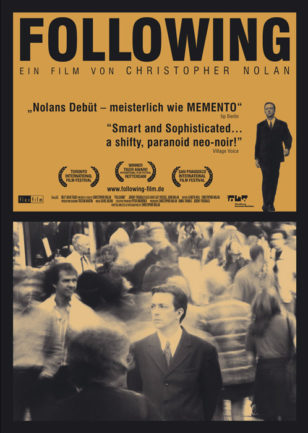 29. FOLLOWING
29. FOLLOWING
The debut film of Christopher Nolan, which hasn’t dated especially well but contains a nostalgic charm it didn’t initially possess. It’s a film that, like the none-too-monumental debuts of guys like Kubrick, Scorsese and Spielberg (with FEAR AND DESIRE, WHO’S THAT KNOCKING AT MY DOOR and THE SUGARLAND EXPRESS, respectively), probably wouldn’t have a chance in Hell of scoring a commercial release (however limited) today. Its non-budget, after all, is painfully evident throughout, from the ultra-grainy black and white film stock on down. Still, the cleverness and ingenuity of the narrative, concerning a naïve young man (Jeremy Theobald) getting drawn into a deadly plot by an outwardly refined criminal (Alex Haw), still registers, as do the surprisingly potent performances of the principal cast members, the suave and stylish Mr. Haw in particular.
28. THE ITEM
Here we have what could be the textbook definition of a 3 AM Movie. THE ITEM is a digitally shot feature (one of the first) about a bunch of small-time crooks who get their hands on a crate containing a phallic-like creature (which incidentally looks a lot like a critter from LOVE GOD, the previous year’s digital groundbreaker) that insinuates itself into the characters’ minds and gets them to turn on each other. There’s gore ‘a plenty in this deliberately cartoony exercise in candy-colored excess, along with a cheesy hand puppet the characters talk to (and with which one has sex!), some drag queens and even an exposed brain. Falling somewhere between Quentin Tarantino and David Lynch, THE ITEM doesn’t always work (in fact it rarely does) but weird movie buffs should get a kick out of it. I certainly did.
27. SITCOM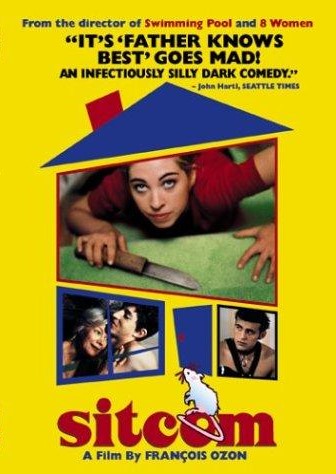
This early effort by France’s Francois Ozon has some of the same demented spirit that informed Sogo Ishii’s fabled CRAZY FAMILY (1984). SITCOM isn’t as strong, alas, being quite uneven overall, and laboring under an ill-defined supernatural intrusion. Said intrusion takes the form of a rat brought home by a businessman (Francois Marthouret) that in short order causes his seemingly contented suburban family to lose their collective minds; the man’s teenage son (Adrien de Van) unexpectedly comes out and his daughter (future writer-director Marina de Van) tries to commit suicide and ends up a paraplegic dominatrix, while the guy’s wife (Evelyne Dandry) attempts to seduce her son in an effort at weaning him from the gay ways. Eventually the father goes mad himself and takes drastic action—an event shown in the opening scene, with the preceding narrative presented via an extended flashback. The film is well photographed with an arresting deadpan style, but Ozon hadn’t yet attained his full powers as a director.
26. CLEOPATRA’S SECOND HUSBAND
If you ask me, this irresistibly demented indie is the film SEX, LIES AND VIDEOTAPE should have been. The writer-director was Jon Reiss, who made the Survival Research Laboratory shorts BAITED TRAP and A BITTER MESSAGE OF HOPELESS GRIEF. The underground sensibilities of those films carry through into CLEOPATRA’S SECOND HUSBAND, about a yuppie couple (Paul Hipp and Bitty Schram) who unwisely invite another couple (Boyd Kestner and Radha Mitchell) to housesit for them. The sitters trash the place, refuse to leave after the owners return and, worst of all, ensnare these nice folks in a twisted psychosexual morass. I could have done without Reiss’ annoyingly loopy camera angles and over-reliance on wide shots (the latter an unfortunate staple of no-budget cinema), but overall this is a defiantly unique, impossible to forget concoction.
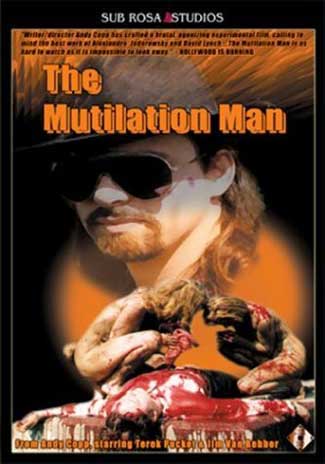 25. THE MUTILATION MAN
25. THE MUTILATION MAN
A wild, weird and totally fucked-up underground feature about a few-bricks-shy-a-load spaz (Terek Puckett) wandering through an unspecified wasteland wherein he ecstatically slices himself up for adoring crowds. In between flashbacks of his abusive father (played by filmmaker Jim Vanbebber) the Mutilation Man meets a comely lass (Kristy Bowersock) as screwed up as he, and they live happily ever after poking, jabbing and ripping up each other’s flesh. Fun stuff, decked out with plentiful hallucinations, which include our hero emerging from a womb-like morass of goo and a last-minute appearance by an angel, and underlaid with nonstop industrial muzak and a near-constant stream of gore ‘n slime. At 80 minutes the film overstays its welcome somewhat (feeling like what it most likely was: a short subject stretched to feature length), but the late Andrew Copp, who wrote, produced and directed, deserves credit for creating something so artfully demented.
24. IMMORTALITY (THE WISDOM OF CROCODILES)
An interesting British made take on vampirism, with Jude Law as a posh bloodsucker on the hunt for a romantic partner, and the exotic and alluring Elina Löwensohn as his prospective mate. Director Po-Chih Leong, an England-bred filmmaker who made this film following three decades of labor in Hong Kong, delivers a good looking, tightly controlled piece of work. The erotic content is unusually blunt in a narrative that begins as a more-or-less standard-issue horror film, complete with a pair of meddling investigators, and gradually morphs into an eccentric love story. The proceedings are quite cerebral in form, indeed perhaps a bit too much so, resulting in a film that despite a fair amount of gory action contains precious little in the way of passion or excitement.
23. SOME NUDITY REQUIRED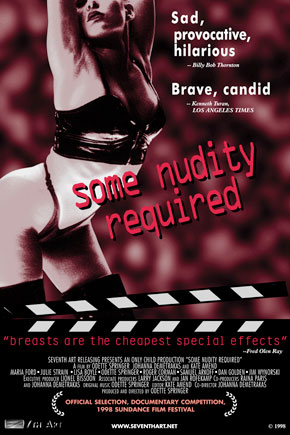
This documentary reminded me of the infamous 1981 feminist porno expose NOT A LOVE STORY, which I mean as a compliment (of sorts). SOME NUDITY REQUIRED is a look into the bowels of B-movie Hell during the mid-nineties, as seen through the eyes of Odette Springer, a longtime music supervisor and sometime actress for Roger Corman who admits upfront that she really hates the movies she worked on under his tutelage. Guided by simplistic narration, the film consists of interviews with B-movie mainstays like director Jim Wynorski, who Springer grills about whether he thinks his films objectify women, and actress Maria Ford, who bitches incessantly about the kinds of depth-free roles in which she was typecast. Springer also ponders at some length about why men respond to films like NAKED OBSESSION and ATTACK OF THE 60 FOOT CENTERFOLD, and examines her own fascination for B-movie sleaze (deciding it stems from childhood sexual abuse). What I especially enjoyed about the film was its in-depth look at the minutia of no budget moviemaking, with documentary footage of Wynorski verbally abusing his cast and crew during a film shoot and a ton of juicy clips from the films under discussion.
22. THE ACID HOUSE
This exercise in Scottish-accented outrage sprung from the mind of Irvine Welsh, who also provided the impetus for Danny Boyle’s TRAINSPOTTING (1996). Welsh’s concerns here are somewhat similar to those of the previous novel/film, which like this one focused on hopeless twentysomething junkies. THE ACID HOUSE has a far wilder, more psychotic arc, adding in personality transference, a sentient fly, an extended acid trip sequence, a talking baby and a chat with God. It consists of three segments, all adapted from stories in Welsh’s collection THE ACID HOUSE, and all taking place in by-now familiar working class Scottish surroundings—where abuse (chemical and otherwise), disillusionment and the epithet “cunt” are all omnipresent. In part one a loser (Stephen McCole) has a bizarre otherworldly meeting, followed by an even more bizarre transformation, while in part two a punk (Kevin McKidd) has to deal with a crazy neighbor (Gary McCormack) with designs on his wife (Michelle Gomez), and in part three an acid-head (Ewen Bremner) undergoes a trip that’s quite literally mind-altering. Director Paul McGuigan isn’t Danny Boyle, and THE ACID HOUSE has none of the propulsive energy or impact of TRAINSPOTTING. It is compellingly nutty, however, and contains a profoundly creepy fake baby that’s a surefire nightmare inducer.
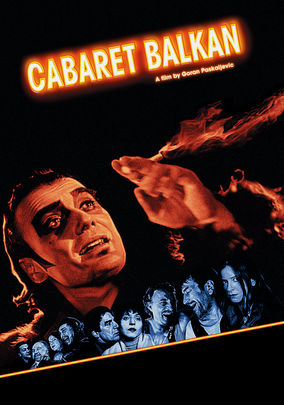 21. CABARET BALKAN (BURE BARUTA)
21. CABARET BALKAN (BURE BARUTA)
A grim, angry black comedy from the Balkans concerning a bunch of depraved sickos and their helpless victims. The message? That life really sucks in that part of the world! Set over the course of a single night, it consists of several interlocking vignettes centered on themes of male aggression. In one, two buddies sparring in a boxing gym end up killing each other, and in another a kid smashes a man’s car and the guy retaliates by tracking down the twerp’s parents and trashing their apartment. There’s also a punk who terrorizes passengers on a bus a la THE INCIDENT (1968) and a CABARET-like MC who opens the film by promising his audience that “We’re going to fuck with you!” Naturally, some of the vignettes are strong and others lackluster. A powerful film, certainly, but hardly the masterpiece so many critics have proclaimed it.
20. LITTLE FRUIT FROM THE EQUATOR (FRUCHTCHEN—AM AQUATOR IST ALLES MOGLICH)
A tropical island off the coast of Africa is the setting for this German-made oddity, about a giant bread fruit that drops out of the sky and lands in front of an impoverished man’s hut. The fruit was bequeathed by the man’s dying mother, who resides on the other side of the island. The guy christens the object “Little” Fruit and, together with some friends, promptly sets off on a lengthy walk to his mother’s house, toting the fruit along on a cart. He runs into several eccentric characters along the way, all of whom have designs on Little Fruit, conveyed via primitive but affecting animation: a priest sees it as a sign from God, while a local warlord views it as a manifestation of his military might. It’s all somewhat muddled from a storytelling standpoint, and further hobbled by the annoying German voice-overs that are inelegantly laid in over the Portuguese dialogue, but the film overall has a pleasant simplicity that nicely befits its fable-like conception.
19. WICKED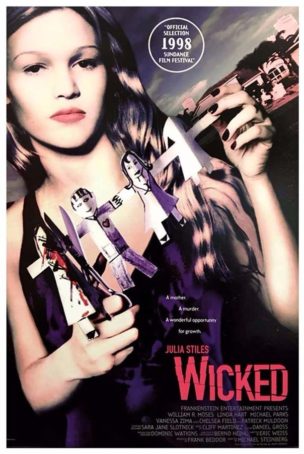
High class trash from director Michael Steinberg (of THE WATERDANCE and BODIES, REST AND MOTION). WICKED is an unapologetically pervy thriller about a dissatisfied teenager (Julia Styles) who makes a play for her father (William R. Moses) after her mother (Chelsea Field) is bludgeoned to death by an unknown assailant. It’s implied that Styles and her pa do the nasty, but then he takes up with a hot blonde (Louise Myrback) and Styles grows jealous—and there’s still the fact that whoever killed Field is still at large. A twisty climax answers any questions we might have, but it also has the effect of turning the remainder of the film into a bad joke. Julia Styles tries her best but is miscast as a nymphet, although the rest of the cast is quite fine, and the burnished visuals eye-pleasing and compelling.
18. THE CASE OF HOWARD PHILLIPS LOVECRAFT (LE CAS HOWARD PHILLIPS LOVECRAFT)
A wildly eccentric French biopic on H.P. Lovecraft, made for the “Century of Writers” series from Arte. I imagine it will be heavily contested by HPL fanatics, as the portrait it paints of the man, as a severely misanthropic, neurotic and racist yutz who shunned the outer world in favor of his own hermetic inner universe, isn’t exactly flattering. Yet it’s entirely in keeping with the Lovecraft I’ve read about, and the filmmakers further the sense of alienation by representing their subject via a two dimensional silhouette and filling in the details of his life with second-person narration. The film is essentially am extended montage comprised of stock footage of HPL’s home town and newly shot imagery made to look archaic, all held together with flashy CGI effects. It’s pleasing and compellingly odd, but also monotonous and agonizingly self-conscious—not unlike its subject!
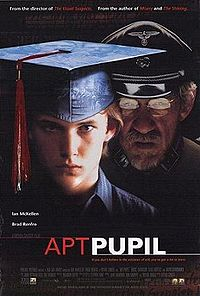 17. APT PUPIL
17. APT PUPIL
I honestly can’t remember another film that received as much negative pre-release buzz as Bryan Singer’s APT PUPIL. Aside from the much-publicized “nudity nightmare” (concerning several boys who were allegedly forced to disrobe for a concentration camp shower scene against their will), there were hostile behind-the-scenes reports all over the internet from self-proclaimed “friends” of the production. This may be part of the reason for the many negative reviews this film received, although maybe not. I admire APT PUPIL a lot, but will have to admit that its detractors have a point. Why, for starters, would an apparently all-American boy like this film’s main character (played by the late Brad Renfro) take the time and effort required to blackmail an escaped Nazi (Ian McKellan)? Never explained. It’s also a shame that the ending was toned down from that of Stephen King’s source novella (where the kid embarks on a random shooting spree). But those criticisms out of the way, this skillfully directed film packs quite a wallop, being a profoundly unsettling investigation into the nature of evil that’s guaranteed to stay with you for days—if not weeks—afterward (although it can’t hold a candle to the similarly-themed Spanish mind-roaster IN A GLASS CAGE).
16. THE INTERVIEW
Actor Hugo Weaving (of THE MATRIX and V FOR VENDETTA) has never been better than he was in this low key but explosive Australian drama, in which he plays a man arrested one morning and forced to endure a succession of intense interrogations. The cops claim Weaving is a murderer but he steadfastly proclaims his innocence. Eventually, however, he changes his tune and admits to the killings he’s charged with, only to reverse himself yet again, claiming he only confessed so his captors would give him food. I predicted the true nature of Weaving’s character early on (and was correct), but still found the proceedings suspenseful and provocative, with the viewer’s sympathies constantly wavering from the police to Weaving and back.
15. ALIEN BLOOD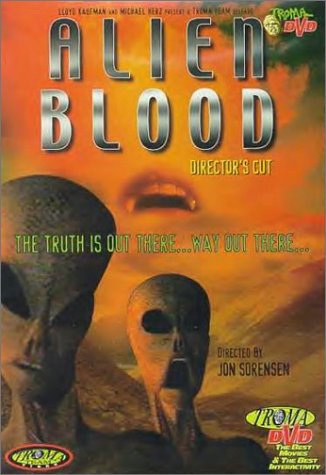
A much weirder-than-average horror/sci fi no-budgeter from England. Set on “the last day of the Twentieth Century,” it’s about a pregnant woman on the run with her young son—however, these two are actually aliens disguised as humans, being pursued by black shade wearing dudes with machine guns. Luckily the woman and her kid know Kung Fu, which comes in mighty handy when they crash a house of bickering vampires. The film is decked out with innumerable “artistic” dissolves and much slow motion action, which distracts more often than not, but there’s also a great deal of gore and elaborate CGI, which are quite impressive considering the paltriness of the budget. Think of it as BAD TASTE meets CLOSE ENCOUNTERS OF THE THIRD KIND.
14. 23
This German biopic concerns the Hannover-based computer hacker Karl Koch (August Diehl), who in the late 1980s hacked into the US military database and sold the info he garnered to the KGB. As the title indicates, the guy was obsessed with 23, the number of the illuminati, who he believed were controlling the world. His hacking activities were an effort to even the scales, yet his life quickly spun out of control in a nightmare of cocaine-fueled paranoia. The filmmaking matches its protagonist’s mood, being appropriately slick and flashy in the early scenes, only to grow dark and jittery in the latter ones. The narrative never quite resolves itself in a satisfying manner, but that’s largely because the reality-based story it tells never did either, with Koch dying under unexplained circumstances at, appropriately enough, age 23. FYI, for another take on the same story see the engrossing made-for-NOVA doco THE KGB, THE COMPUTER AND ME, which relates the story of Clifford Stoll, the Berkley computer whiz who brought Koch down.
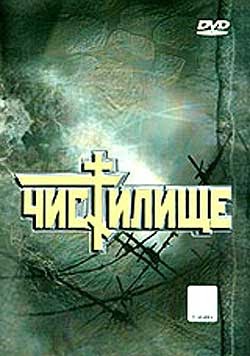 13. PURGATORY (CHISTILISHCHE)
13. PURGATORY (CHISTILISHCHE)
1998 was the year of Steven Spielberg’s SAVING PRIVATE RYAN, which allegedly broke new ground in its depiction of the ugliness of combat. Few seem to know, then or now, about the Russian made-for-TV movie PURGATORY (CHISTILISCHCHE) from the same year, which far outdid Spielberg’s film in grit, gore and sheer unpleasantness. It’s been described as playing “like THE GREEN BERETS directed by Lucio Fulci,” a comparison with which I’ll have to agree. The subject is the disastrous Chechen campaign of 1994-95, when Russian forces invaded Chechnya’s capital city Grozny, resulting in heavy casualties on both sides. Writer-director Aleksandr Nevzorov was a TV reporter who covered the conflict, and based his script on events he personally witnessed. There’s no real story to speak of, with the film beginning quite literally in the middle of a bloody skirmish and continuing in that fashion for the remainder of its running time. Oftentimes it’s difficult to tell the Russians and Chechens apart, which seems to have been the whole point, and nor do any of the soldiers and bandits fighting this war (civilians are seen only as corpses and parts of same) ever register as distinct individuals. That lack of character-based grounding hurts the film, whose concern is solely with the bigger picture, but taken as sheer blood-and-guts spectacle it more than does its job.
12. ZOR—NEVER UNDERESTIMATE THE FORCE!
A fairly typical Bollywood epic, meaning that even at its most overwrought ZOR—NEVER UNDERESTIMATE THE FORCE! contains more energy and imagination than 95 percent of the decade’s other movies. In this one, a determined journalist (Bollywood action mainstay Sunny Deol) is looking to uncover the identity of a terrorist organization responsible for a series of bombings. He runs afoul of two fellow scoops who try their damndest to thwart his efforts–they fail, though, and our hero ends up falling for one of them. These lovebirds get married but their bliss is short lived, as the protagonist’s brother turns out to be the leader of the offending organization…and this is only the first hour of a film that begins as a thriller, only to morph into a slapstick comedy, a sappy romance, an outrageous John Woo-styled actioner and, finally, an impassioned courtroom drama.
11. VERY BAD THINGS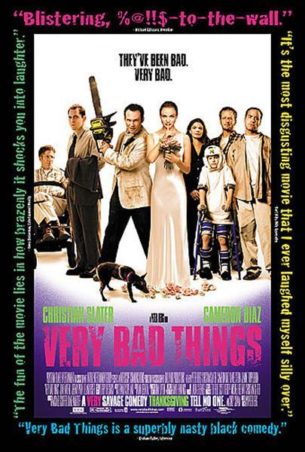
In a decade of wussified black comedies this mean-spirited yuckfest, the directorial debut of actor Peter Berg, was the real thing: violent, bitter and bearing a core of genuine evil, yet always funny as Hell. As one reviewer stated, it’s a film “for the sick fuck in all of us.” I’m not ashamed to say I loved VERY BAD THINGS, and nor do I think it represents the downfall of civilization. The plot? Five buddies (whose ranks include Christian Slater, Daniel Stern and Jon Favreau) hit Vegas for a bachelor party, accidentally kill a prostitute and…well, if you’re at all familiar with the fiction of Jim Thompson you’ll have some idea as to the relentless kill-‘em-all outcome. What Berg accomplished so memorably here was the updating of Thompson’s universe to the nineties, without compromise or apology.
10. LOVERS OF THE ARCTIC CIRCLE (LOS AMANTES DEL CICULO POLAR)
Otto and Anna meet as children in a boarding school, and it’s love at first sight. They grow into two extremely photogenic adults, with Otto (Fele Martinez) becoming an aviator while Anna (Najwa Nimri) drifts through a series of unfulfilled relationships, until the two finally meet their destiny in the Arctic Circle. If all this sounds familiar, it should. Writer/director Julio Medem seems to have carefully studied Vincent Ward’s MAP OF THE HUMAN HEART (1992), right down to its final snowbound shot (I’m actually surprised that Ward never filed a plagiarism lawsuit). Of course, Medem does give his film a dreamy, poetic façade all its own, and the narrative–although occasionally clumsy in its mingling of past and present–is never less than thoroughly compelling. It’s also admirably devoid of cheap sentiment, something which, memorable though it was, cannot be said of Ward’s film.
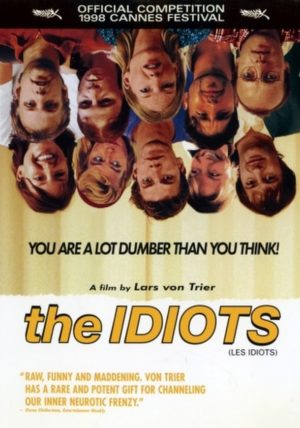 9. THE IDIOTS (IDIOTERNE)
9. THE IDIOTS (IDIOTERNE)
This Lars von Trier outrage, the second in the Dogma 95 Danish film series, can be (and has been) viewed as straightforward “tardsploitation” or as…something else. What exactly that “else” is I’m not exactly sure! It’s one of the strangest and least commercial films of all time, that’s for certain, with a group of professional Danes obsessed with behaving like idiots in public. This inspires some interesting reactions: people buy dead flowers from these freaks, and at one point a biker helps one of them piss in a public restroom (and even shakes the guy’s wang). These folks perform their charade as an affront to bourgeoisie values, and if the vitriolic reaction to this film was any indication they’re definitely on the right track. American critics raged about its political incorrectness, while the French bitched that Von Trier was trying to upstage their own Jean-Luc Godard (which in my view he did). USA Pictures even went so far as to release THE IDIOTS in the US with black bars covering all nude body parts (thus effectively neutering a climactic orgy sequence). But like all truly subversive art, this film, nudity and all, simply refuses to go away.
8. I STAND ALONE (SEUL CONTRE TOUS)
An incendiary, lacerating cinematic kick in the nuts about an aging butcher (Philippe Nahon) trying to find work in France, circa 1980. Increasingly frustrated in his attempts (he’s a wife-beater, an ex-con and an all-around grouch), he finds himself growing angrier and angrier, indulging in psychotic fantasies and thoughts of revenge—against his family, his acquaintances, society in general and himself. In other words, this guy’s a walking time bomb who makes TAXI DRIVER’S Travis Bickle look like Mary Poppins. I STAND ALONE isn’t as powerful as TAXI DRIVER, mostly because writer-director Gasper Noe, in his feature debut, tries a bit too hard to fuck with our heads. Not that he doesn’t evince enormous skill in doing so, but the non-stop audio-visual bombardment grows tiresome pretty quickly—although the outrageously intense, sick-assed ending (prefaced with an on-screen warning) goes a long way toward compensating.
7. AWAY WITH WORDS (SAN TIAO REN)
Nobody seems to like this film but me—and I really liked AWAY WITH WORDS, finding it an amazing, disorienting, eye-popping, awe-inspiring piece of work from the Australian born, Hong Kong based cinematographer Christopher Doyle. It was his directorial debut, and proved once and for all that Doyle is without a doubt one of the most accomplished and inventive image-makers on the planet. It’s set in and around a seedy nightclub in late-nineties Hong Kong where three quirky characters converge: a gay Australian immigrant (Kevin Sherlock) with a penchant for sleeping in 7-11s, a shiftless hipster (Tadanobu Asano) haunted by memories of his childhood, and a young woman (Mavis Xu) who gets to know and love both of them. In form it closely resembles Doyle’s collaborations with Wong Kar Wai, particularly CHUNKING EXPRESS and FALLEN ANGELS (leading me to believe that Doyle had a far greater influence on those films than he’s generally given credit for), but is several times more abstract and stylistically extreme. It rarely ever makes sense, and nor is it meant to, being pure, unadulterated cinematic anarchy from start to breathless finish. It’s best to simply sit back and let Doyle’s amazing kaleidoscopic imagery wash over you; if you’re willing to surrender yourself to this film’s unique rhythms I guarantee you won’t be sorry.
6. OF FREAKS AND MEN (PRO URODOV I LYUDEY)
A Russian film that’s as weird as any ever made, set in the early twentieth century and centering on two upper middle class families caught up in the nefarious schemes of some sinister pornographers. The resulting shenanigans involve a Chang and Eng-like pair of Siamese twins, an aging nymphomaniac, an S&M loving young woman and enough sheer perversion to fill a dozen David Lynch movies. It’s lensed in sepia tones with minimal music and silent movie inter-titles, creating a Guy Maddin-like atmosphere at once campy and elegant. I’m not sure what the point may have been (or if there even is a point), but the film is a one-of-a-kind oddity pulled off with consummate skill.
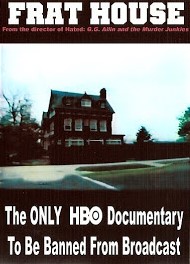 5. FRAT HOUSE
5. FRAT HOUSE
An HBO Undercover documentary that was never aired. The official reason was that parts (if not all) of it were believed to have been staged, but rumor has it that HBO dropped the film after receiving some pretty serious threats from college fraternities across the country. Admittedly, some bits seem a tad unconvincing (in one scene a door closes on the camera, and yet a splice later we’re on the other side of said door), but that didn’t ruin my enjoyment of this unrelenting testosterone-fest. Future HANGOVER helmer Todd Phillips was both the director and protagonist of this doc, which seeks to capture fraternity hazing rituals raw and uncensored. As FRAT HOUSE begins, filming commences at one college until the Frat head–a muscle-bound nutcase ironically named Blossom—freaks out and threatens Phillips. Moving on, he and his colleagues find a frat house at another school that will let them film, but only if they undergo the hazing process themselves. This entails chugging tabasco sauce and then spitting it into a cup for another pledge to drink, standing on their heads for hours on end, having to walk around blindfolded while being doused with boiling hot and/or freezing cold water, etc. One of Phillips’ collaborators ends up hospitalized, and Phillips himself remarks that his tormenters seem to be enjoying themselves a bit too much. Not unlike the viewer!
4. A SIMPLE PLAN
Perhaps the most underrated film directed by Sam Raimi, A SIMPLE PLAN follows Scott Smith’s brilliant 1994 novel extremely closely, and so–to my way of thinking, at least–there’s really no way it can go wrong. Of course, Raimi, in his first truly “serious” film, was quite inspired, which further stacks the deck in its favor. Raimi’s oeuvre, which includes the EVIL DEAD flicks and DARK MAN, might not seem to render him the ideal director for Smith’s deadly serious study of greed and murder, but look a little closer and you’ll see a filmmaker of style and grace who (not to take anything away from THE EVIL DEAD) has long been ready to break out of the genre ghetto. Raimi’s spare and evocative work here rivals that of his former colleagues the Coen Brothers in FARGO, and the acting is uniformly great, with honors going to the late Bill Paxton as a normal guy who finds millions of dollars’ worth of lost cash, and also Billy Bob Thornton, who steals the show as Jacob the loser’s loser.
3. KHRUSTALYOV, MY CAR! (KHRUSTALYOV, MASHINU!)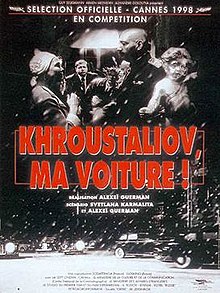
The second-to-last film directed by Russia’s late Aleksey German, one of the world’s most distinctive and uncompromising filmmakers. You won’t mistake a German film for one by anyone else, and that’s especially true of KHRUSTALYOV, MY CAR!, which brings history to boisterous life in a succession of incredibly elaborate single take panoramas, lensed in magisterial black and white. The setting is mid Twentieth Century Russia, in which governmental repression and punishment were constants. The story, such as it is, involves a military doctor arrested on trumped-up charges and forced to attend to a dying Joseph Stalin, with his family—through whose eyes much of the film is seen—getting forcibly relocated in the process. For all the bleakness and oppression suffusing the film (which includes a scene of the protagonist getting violently gang-raped) it has a madcap energy that recalls Fellini and Kusturica. This doom-laden era, it seems, gave rise to an irrepressible freakshow atmosphere, unforgettably represented by German’s virtuosic staging. At nearly a full two-and-a-half hours KHRUSTALYOV, MY CAR! does overstay its welcome somewhat, a problem with German’s filmography overall (as well as those of Fellini and Kusturica), but I’ll give it props for being a rare film that contains too much inspiration rather than, as is increasingly becoming the case, too little.
2. FEAR AND LOATHING IN LAS VEGAS
Terry Gilliam’s Hollywood career was crippled by the tumultuous productions of BRAZIL and THE ADVENTURES OF BARON MUNCHAUSEN, but FEAR AND LOATHING IN LAST VEGAS (a portion of whose behind-the-scenes strife is documented in the 2003 doco BREAKFAST WITH HUNTER) damaged it irrevocably. It’s blatantly amoral, often outright incoherent, self-indulgent and completely insane–and so quite true to Hunter S. Thompson’s semi-autobiographical account of his adventures in Las Vegas, circa 1971. The Thompson stand-in is played by Johnny Depp, who’s in search of the “heart of the American Dream” together with his lunatic lawyer (Benicio Del Toro), but finds only various degrees of ugliness–and it certainly doesn’t help matters that both characters are doped out of their respective skulls the entire time. Depp and Guillermo Del Toro are simply brilliant in the lead roles, fully engaging in the anarchic spirt bequeathed by Gilliam. Excellent cameos, too, by the likes of Cameron Diaz, Christina Ricci, Gary Busey, Tobey Maguire and especially Ellen Barkin, who recently turned on Gilliam but in her brief role here proved she was quite possibly the ideal Terry Gilliam performer.
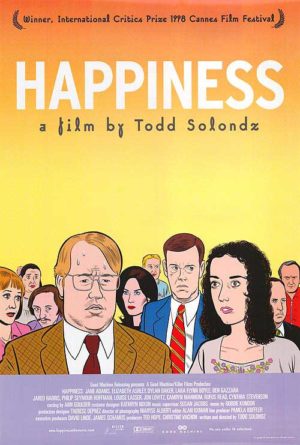 1. HAPPINESS
1. HAPPINESS
To call this the nastiest movie of ‘98 is no small claim, making it by default one of the nastiest movies all time. Its own writer-director, one Todd Solandz, has never been able to match its caustic brilliance in the years since, and nor in my view has anyone else. The ironically titled HAPPINESS concerns a bunch of thirtyish drudges and their doomed attempts at finding contentment. Since the H-word always seems to elude them, these folks take refuge in their jobs (one misguided gal tries teaching foreign immigrants in the midst of a strike) or their perversions (a computer worker spends his nights making obscene phone calls). The connecting thread? They’re all completely miserable! Many people hate this movie, including its own distributor Ted Turner (who famously tried to have it banned), writing it off as a disposable shock-fest. It is shocking, I’ll say that, particularly one especially pointed plot thread involving a suburban child molester (the scene where this guy describes his crimes to his eleven-year old son has to be one of the most disturbing things I’ve ever seen). Another features a hefty woman who murders her doorman and chops up his body…and so on, through anecdotes about divorce (“Aw shit!” the scorned wife screams, “now I gotta get another fuckin’ face-lift!”), impotence, loneliness, jealousy, boredom and other things polite society says we shouldn’t think about. Solandz, unlike his characters, never flinches or looks away, and nor do the actors. Of those actors Dylan Baker delivers the year’s finest performance as the perv, while Philip Seymour Hoffman is nearly as strong as the phone caller, and even Lara Flynn Boyle is terrific (for once) as a stuck-up, bitchy professional (typecasting?).
